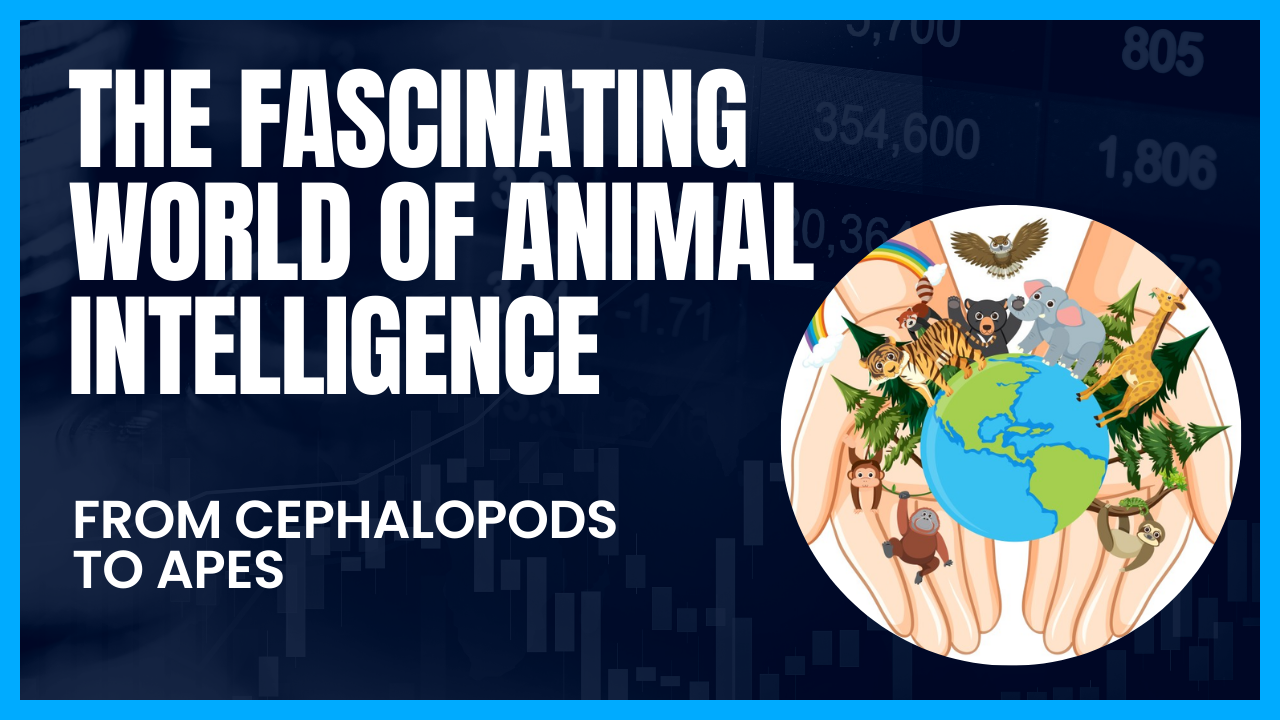In the vast tapestry of the animal kingdom, intelligence comes in various forms, surprising us with its diversity and complexity. From the deep-sea realms inhabited by cephalopods to the lush canopies where apes swing effortlessly, each species exhibits a unique set of cognitive abilities. This article delves into the captivating world of animal intelligence, exploring the minds of cephalopods and apes to understand the fascinating spectrum of cognitive prowess.
- Cephalopods: Masters of Adaptability
Cephalopods, including octopuses, squids, and cuttlefish, are renowned for their exceptional problem-solving skills and adaptability. With large brains relative to their body size, cephalopods demonstrate an ability to navigate complex environments and exhibit behaviors suggesting advanced problem-solving capacities. Octopuses, in particular, are known for their remarkable escape strategies, demonstrating an impressive level of cognitive flexibility.
- Tool Use in Animals: A Sign of Intelligence
One of the hallmarks of intelligence is the ability to use tools, and several animal species, including certain cephalopods, have demonstrated this capability. Octopuses, for example, have been observed using coconut shells and other objects as shelter or as a means of camouflage, showcasing their ingenuity and ability to manipulate their environment for survival.
- Primate Intelligence: A Closer Look at Apes
Apes, including chimpanzees, bonobos, gorillas, and orangutans, are our closest relatives in the animal kingdom. These highly intelligent beings share a significant amount of DNA with humans, and their cognitive abilities continue to astound researchers. Apes exhibit complex social structures, tool use, and problem-solving skills. Studies have shown that they can use tools for hunting, create and use symbolic language, and even engage in planning for the future.
- Communication in Animal Kingdom: Beyond Words
Communication is a key aspect of intelligence, and both cephalopods and apes employ sophisticated methods to convey information. Cephalopods communicate using chromatophores, changing the color and pattern of their skin to signal different emotions or intentions. Apes, on the other hand, use a combination of vocalizations, gestures, and facial expressions to convey a wide range of messages within their social groups.
- The Role of Enrichment in Cognitive Development
Enrichment plays a crucial role in nurturing animal intelligence. Zoos and aquariums worldwide implement various enrichment activities to stimulate the minds of animals in captivity, providing challenges that mimic their natural behaviors. For cephalopods, this might involve intricate puzzles and hiding food for them to discover, while apes benefit from activities that mimic foraging and problem-solving in the wild.
- Cephalopod Learning and Memory: A Window into Advanced Cognitive Abilities
Cephalopods exhibit not only problem-solving skills but also an impressive capacity for learning and memory. Studies have shown that octopuses can learn through observation and experience, remembering solutions to problems and adapting their behavior accordingly. Their ability to navigate complex mazes and remember the location of food sources highlights a level of cognitive sophistication that goes beyond mere instinct.
- Apes and Social Intelligence: Complex Relationships and Cooperation
Apes are highly social animals, and their intelligence is closely tied to their complex social structures. Chimpanzees, for instance, engage in intricate social behaviors, including cooperation, conflict resolution, and even strategic alliances. Their ability to navigate the intricate dynamics of social relationships showcases a form of intelligence that extends beyond individual problem-solving to cooperative and community-based intelligence.
- Mirror Self-Recognition and Concept of Self: A Marker of Higher Cognitive Abilities
One of the intriguing aspects of ape intelligence is their ability to recognize themselves in mirrors, indicating a level of self-awareness. This cognitive skill, known as mirror self-recognition, is considered a crucial marker of higher intelligence and is observed in species like chimpanzees and orangutans. This ability suggests a sense of self and a capacity for introspection that goes beyond basic survival instincts.
- Cephalopod Camouflage: An Artistic Display of Cognitive Mastery
The camouflage abilities of cephalopods are not only a means of survival but also a testament to their cognitive prowess. Octopuses, in particular, can change not only the color and pattern of their skin but also the texture, allowing them to blend seamlessly with their surroundings. This sophisticated form of camouflage requires rapid information processing and precise control over their skin, showcasing the artistic side of animal intelligence.
- Apes and Tool-Making: Crafting Solutions to Navigate the Environment
While many animals use tools, apes have demonstrated a remarkable ability to create tools for specific tasks. For example, chimpanzees have been observed using sticks to extract insects from tree bark or using leaves as sponges to collect water. The capacity for tool-making requires not only problem-solving skills but also the ability to envision and create a tool to achieve a specific goal, highlighting the depth of their cognitive abilities.
- The Role of Play in Cognitive Development: Insights from Apes and Cephalopods
Both apes and cephalopods engage in play, which is believed to contribute significantly to their cognitive development. Play behaviors in young apes mimic adult behaviors, providing them with opportunities to practice and refine their skills. Similarly, cephalopods engage in playful activities, which researchers suggest may contribute to their ability to adapt to different environments and stimuli.
Conclusion:
The fascinating world of animal intelligence extends beyond the basics of problem-solving, encompassing learning, memory, social dynamics, self-awareness, and even artistic expression. As we continue to unravel the intricacies of cephalopod and ape cognition, we gain a deeper appreciation for the diverse ways in which intelligence manifests in the animal kingdom. These extraordinary creatures challenge preconceived notions and invite us to explore the vast spectrum of cognitive abilities that enrich the tapestry of life on Earth.
